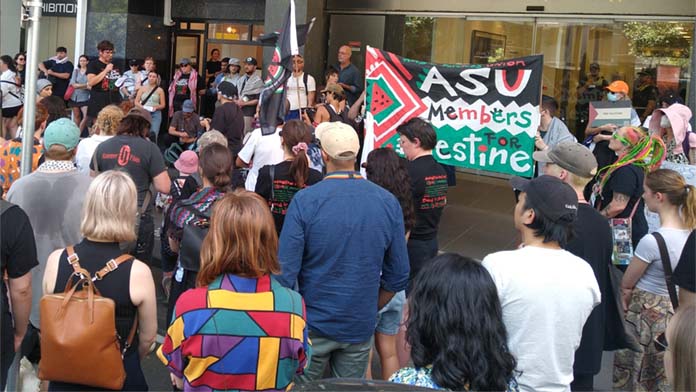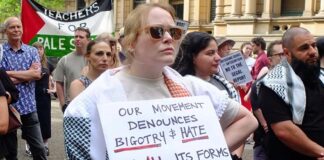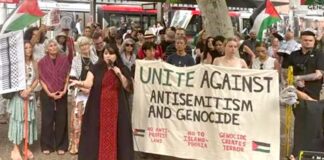Union members in social and community services in Melbourne took up to four hours of unprotected strike action for Palestine on Thursday 22 February.
Around 500 workers and supporters took part in a lunchtime rally beginning at the Victorian Council for Social Service (VCOSS) that marched to the Federation of Community Legal Centres, with some staying off work for the rest of the day.
The workers, members of the Australian Services Union (ASU), called on their organisations break their silence on Israel’s genocide in Gaza.
The unofficial strike was organised by the rank-and-file group ASU Members for Palestine.
Workers at a number of Community Legal Centres and social and community service (SACS) workplaces participated, including Inner Melbourne Community Legal, Legal Services in Fitzroy, South-East Monash, Mooney Valley, West Heidelberg Community Legal, West Justice, Consumer Action Law Centre, the Victorian Aboriginal Legal Service (VALS), Friends of the Earth and the Foundation for Young Australians (FYA), where workers walked-off for the second time in a month.
Demanding SACS organisations break their silence
“The action came after workers in social and community services grew frustrated with the lack of action on Palestine from their employers and organisations, many who claim to be about human rights, justice and equality,” Monica Campo, one of the walk-off organisers and the chair of the rally, told Solidarity.
“With a few exceptions, most organisations have remained silent on the genocide, even after the International Court of Justice (ICJ) ruling of plausible genocide.”
ASU members for Palestine launched an open letter in December, now signed by 500 workers, calling on their employers to end their silence and speak up for Palestine. Many also wrote to their CEOs and boards. But few organisations changed their public stance.
Speakers at the rally described the stark hypocrisy of working in roles that are fundamentally connected to justice, equality, safety and human rights for organisations that can’t bring themselves to apply the principles to Palestine.
Well-known Palestinian activist Uncle Ihab and community lawyer, Shifrah Blustein, also addressed the rally.
Uncle Ihab declared “enough is enough” and called on others in the CBD to join the walk-out. Shifrah spoke about the long history of Israeli occupation, stretching back to 1948 and before, and Australia’s longstanding support for Israel.
She highlighted the expansionist logic of Zionism and argued that its ideology of supremacy, elimination and colonialism was fundamentally incompatible with SACS organisations’ professed values of social justice and human rights.
Walking off
In the lead-up to the strike a representative for the walk-off emailed the peak body, the Federation of Community Legal Centres (FCLC), to notify them and received a reply advising that the ASU open letter had been shared with all FCLC members.
In an email to CLC CEOs, Federation CEO Louisa Gibbs acknowledged the right to protest and noted that FCLC would not “prevent or retaliate against our staff members who wish to join protests relating to this issue”.
Some walked off with the support of their employers. VALS released a public statement declaring its support for the walk-off and giving permission for staff to attend. This was followed by a similar statement from Friends of the Earth.
A day before the action, workers at another CLC were given verbal assurances from management that they could attend. At other workplaces workers were told they could attend if they took leave.
ASU delegates at one organisation were told in an email that, “Given [the organisation’s] public position is clear and [the organisation] has supported staff to attend social issues-based rallies and public events in the past we support attendance at this event during work time.”
However, the email added, “ASU members attending the walk discuss and obtain permission from their line manager to ensure no clients are impacted negatively as a result.”
The action was a useful way of taking advantage of these service organisations’ desire to maintain their social justice credentials to show how workers can take action for Palestine.
Elsewhere, workers were threatened with having their pay docked. At one workplace, workers received a message saying, “If you attend the walk out this afternoon, we are required by law to not pay you for four hours as it is unprotected action.”
This shows the need to keep building rank-and-file organisation so workers can take action even where their employers are hostile.
Anti-strike laws
The action showed how workers can fight to reclaim the right to strike. Organisers circulated leaflets to workers that, while being upfront about Australia’s draconian anti-strike laws and the potential consequences for engaging in the action, noted that retribution was unlikely and, importantly, provided examples of the numerous occasions in recent times where workers in Australia haven broken the anti-strike laws and won.
The strikers also received solidarity from unionists and supporters elsewhere. CPSU members at Victorian Legal Aid passed a motion of solidarity. ASU members outside Victoria held a range of events in workplaces across the country, including virtual watermelon morning teas.
Solidarity photos were received from ASU members in SA as well as from a large grouping of ASU members in Mparntwe/Alice Springs. Greens MP for Richmond, Gabrielle De Vietri also published a video on social media declaring her solidarity with the strikers.
For Monica, the walk out not only represented “a challenge to institutional complicity with genocide but also a challenge to Australia’s restrictive industrial laws.
“We hope the action will inspire other industries to step up and go on strike for Palestine, particularly those unions and workforces with direct industrial connections (able to) disrupt the Israeli economy that supports the Zionist war machine.”
By Tom Fiebig
Shifrah, a community lawyer, spoke at the rally. Solidarity republishes her speech in full.
Some things about our organisations’ priorities are self-evident right now.
The orders of the world’s highest court to stop genocide are being flouted by Israel and its western backers. Yet all we’ve heard is crickets from the vast majority of our organisations who say they stand for the rule of law and human rights. (Thank you VALS and HRLC for your stance.)
On Tuesday, Palestinian Centre for Human Rights lawyer Nour Abo Nour was murdered along with seven of her family members including her daughter in an airstrike on Rafah. 1.5 million displaced Palestinians in Rafah are facing annihilation and a bigger ethnic cleansing campaign than the original Nakba. We are watching the moment Israel tries to complete its colonial project through open genocide. And still CLCs and our peak don’t think it’s their role to comment.
We demand action from our organisations that calls for an end to this genocide but that also understands it as part of a project stretching back to 1948 and before, when Zionist militias massacred and expelled Indigenous Palestinians from their homeland to establish an ethno-state. We demand action that acknowledges the 76 long years of Palestinian oppression and suffering since.
On top of that, our own government is deeply implicated in this history—not only through its support for Israel’s crimes (one settler colony to another) and its withdrawal of UNRWA funding, but also through the intelligence supplied by its Pine Gap facility and the weapons manufactured in this city and across the continent which are indispensable to Israel’s genocide now and decades of apartheid and ethnic cleansing that led us here. (Shout out to the activists repeatedly shutting down HTA, Rosebank Engineering and Zim shipping!)
Even after all that, our organisations don’t think it’s our place to say a thing. But it is not only about our sector’s silence on the rule of law and human rights that we should be angry about. It is also about the pervasive acceptance of Zionist talking points and manipulations by our orgs and civil society at large.
Zionism is not a cultural, ethnic or religious identity. It is a political ideology of supremacy, elimination and colonialism. No form of Zionism is compatible with the work of our organisations.
Equality, safety, freedom and human rights are for everybody. We should not tolerate our organisations accommodating an ideology that says that only certain people deserve safety and human rights. That some lives are more important than others. That apartheid, occupation, ethnic cleansing and genocide of one people is justified for the supposed security of another people.
But amidst the deep disappointment and anger at our organisations that we are here to express, this moment and our activism around Palestine is also an opportunity for us to repoliticise the CLC sector through collective organising. Not only in the fight for a liberated Palestine, but for all victims of genocide, ethnic cleansing, colonialism and imperialism.
The experiences and struggles of their victims are products of the same global system of racism, colonialism and capitalist exploitation and extraction that oppresses CLC clients and decimates our environment here in so-called Australia.
As workers, we need to force our organisations to make these connections and to refuse the neoliberal demands of pacification and compliance that being part of the NGO industrial complex entails.
The work of CLCs is meaningless if it sells out the struggle for justice in favour of funding and respectability, if it abandons advocacy for the rights of all peoples when it is politically inconvenient.
We must do more, as community organisations and as workers. Let today be the beginning. Until Palestine is free and all oppressed peoples are liberated. Free free Palestine.






